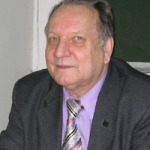© 2011 V.I. Kharitonova, Yu.M. Khrustalev
2011 – № 1 (1)
V.I. Kharitonova interviews Yu.M. Khrustalev
Information:
 Yury Mikhailovich KHRUSTALEV, Doctor of Philosophy, professor, chair of the Department of Philosophy and Political Sciences of the 1st Moscow State Medical University named after I.M. Sechenov responds to the questions of the editor-in-chief of the “Medical Anthropology and Bioethics” journal. Professor Khrustalev is the author of many textbooks on philosophy, political sciences, philosophical problems of science and medicine, as well as on bioethics, including “From ethics to bioethics” (2010), “Bioethics” (2011).
Yury Mikhailovich KHRUSTALEV, Doctor of Philosophy, professor, chair of the Department of Philosophy and Political Sciences of the 1st Moscow State Medical University named after I.M. Sechenov responds to the questions of the editor-in-chief of the “Medical Anthropology and Bioethics” journal. Professor Khrustalev is the author of many textbooks on philosophy, political sciences, philosophical problems of science and medicine, as well as on bioethics, including “From ethics to bioethics” (2010), “Bioethics” (2011).
Key words: bioethics, biomedical ethics, morality, law, intellect, conscience, faith, anthropology, medical anthropology, medicine
Abstract: During the interview Prof. Khrustalev discussed the issues of bioethics and medical ethics formation in the Russian science and pedagogical practice; peculiarities of teaching corresponding subjects in medical schools; touched upon the problem of lack of overarching educational program in bioethics, to such extent that some lectors can impose their own religious or ideological ideas on students, etc. The chief idea of Yu.M. Khrustalev is as follows: “The man should follow his reason while solving any problem, but under control of his conscience”. This motto allows this recognised scholar and teacher to balance accurately teaching ideological disciplines and leading a department with very different faculty members. Yu.M. Khrustalev, one of the ‘founding fathers’ of bioethics in the USSR and Russian Federation (the author of a series of books and manuals) , elaborated on the ‘alignment of forces’ in the field of bioethics science and education, peculiarities of ethical committees’ formation and work in Russia.
Yury M. Khrustalev spoke about specifics of teaching bioethics at medical universities in Moscow. The course “Bioethics” in Russian medical schools is now taught by the faculty of philosophical departments. The question of whether this course should be taught in the frame of philosophy, as a part of the course “Philosophy. Bioethics”, is discussed now at the level of the Ministry of Education.
Before an academic course “Bioethics” has been introduced into the Russian higher education system, there were courses on medical ethics and deontology that were taught at some universities from the mid 1970’s.
“Bioethics” as an academic subject has been taught at Russian universities for at least 15 years. The interest in bioethics as a specific world-view and an academic field appeared in the time of the Soviet Union. At the 1st Moscow State Medical University this school of academic thought appeared almost immediately after the term “bioethics” had been introduced in 1970’s by Van R. Potter; it happened thanks to the activities of M.Ya. Yarovinskiy who personally knew Potter.
According to professor Khrustalev, the main goal of the above mentioned academic course (now consisting of 36 hours) is encouraging to-be-medics to use the rule of reason while expressing the need to solve any ethically complicated situations according to one’s own conscience. Intellect and conscience are two basic requirements of the bioethical position of a medic, stated Prof. Khrustalev.
The most crucial question of teaching bioethics in Russia nowadays is whether professors are able to do it on the basis of Orthodox dogma. Unfortunately, teaching bioethics from a religious point of view is an ongoing process at some Moscow universities, like the 2nd Medical University. There is no unified educational program for medical students in Russia which practically means that there may be huge differences of basic positions in teaching bioethics. Professor Khrustalev paid special attention to the fact that until very recently there was a Coordinative educational and methodical council of humanitarian education in high schools at the Russian Ministry of Public Health (Khrustalev was a member of this council), but it does not exist any longer.
Scientific research of students, post-graduates, as well as of faculty members at Russian medical universities is controlled by university ethical committees.